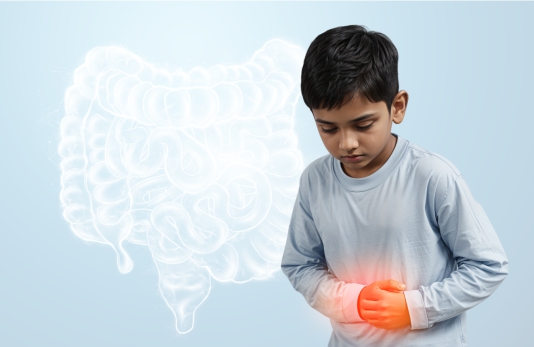Many parents might have heard this from their children “Maa, I’m having a stomach pain and I can’t even get out of bed. Can I take a leave?”
This is a common excuse children give when they don’t want to go to school because they haven’t finished their homework or studied for exams.
Parents often know their children are making excuses but still allow them to take leave.
The problem arises when the children actually feel severe lower abdominal pain, which they can’t bear. This could be a sign of appendicitis or any other health issues.
What’s Appendicitis?
Appendicitis occurs when the appendix, a small pouch located in the lower abdomen, becomes inflamed or filled with pus.
It can affect individuals of any age but is most common among those aged 9 to 15. Whereas, children aged between 2 to 8 are less vulnerable to it.
It typically arises due to obstruction of the appendix or infections in the gastrointestinal area which in turn can lead to inflammation. Obstruction can occur because of fecal matter, foreign bodies, or even tumors.
Injuries to the appendix can also be a notable reason for appendicitis in children.
How To Know If A Child Has Appendicitis?
As a parent, you have to be vigilant for early signs of appendicitis in kids.
Common symptoms the child can experience due to appendicitis include:
- Lower Abdominal Pain: Begins around the belly button and moves to the lower right abdomen, becoming more intense over time.
- Loss of Appetite: The child may have a reduced desire to eat or lack of interest in food.
- Low to Mild Fever: Body temperature increases, typically below 100.4°F (38°C).
- Nausea/Vomiting: Uneasiness in the stomach or an urge to vomit.
- Diarrhea or Constipation: Changes in bowel habits may occur, either loose stools, or difficulty passing stool.
When your child experiences these symptoms, it can be a concerning condition. You have to consult a medical expert if you suspect appendicitis in your child.
If Left Untreated?
Delaying treatment can lead to complications like rupturing of appendicitis.
When left untreated, it can result in peritonitis (inflammation of the abdominal lining), abscess formation, and septicemia (blood poisoning).
How Is Appendicitis In Children Diagnosed & Treated?
Diagnosing appendicitis early is indeed the best option as it can help prevent complications and promote faster recovery for the child.
Diagnosis of appendicitis typically involves a combination of medical tests, which include:
- Blood Tests
- Urine Tests
- Abdominal Ultrasound Scan
- CT Scan
Through these, can identify inflammation, infection, or other abnormalities in the appendix.
If the child is diagnosed with appendicitis, the inflamed appendix has to be removed, before the condition worsens.
Surgery is the preferred treatment.
Not to worry much about it.
Now, with the advancement in technology, the inflamed appendix can be removed through laparoscopic surgery, which is a minimally invasive surgery.
Can Return To The Home After Appendix Removal Through Laparoscopy
Laparoscopic Appendectomy – a daycare surgery involves small incisions in the abdomen through which a tiny camera and surgical instruments are inserted to remove the inflamed appendix.
This procedure holds several benefits over conventional surgery, such as
- Smaller Incisions
- Reduced Pain & Scarring
- Shorter Hospital Stays
- Faster Recovery
Can Appendicitis In Children Be Prevented?
There is no sure way to prevent appendicitis in children or individuals of any age.
Yet certain dietary and lifestyle habits may help reduce the risk.
One such habit is maintaining a high-fiber diet.
Include the following in your children’s diet.
- Buttermilk, which reduces the growth of bacteria.
- Lemon juice with honey to aid in digestion
- Garlic, which reduces inflammation
- Green veggies and fruits, which are rich in fiber and prevent constipation.
While these dietary recommendations may contribute to reducing the risk of appendicitis in children, it’s essential to maintain a balanced and nutritious diet overall.
Craft your child’s personalized diet plan with a dietitian to ensure a healthy life.
Remember,
To Be More Aware Of…
If your child experiences a high fever reaching 104 degrees Fahrenheit or 40 degrees Celsius accompanied by other symptoms of appendicitis, you have to immediately seek medical attention.
Never let appendicitis in children beyond our control, consult Dr Mehta’s medical expert early to know the exact reason behind it and get it diagnosed & treated.

